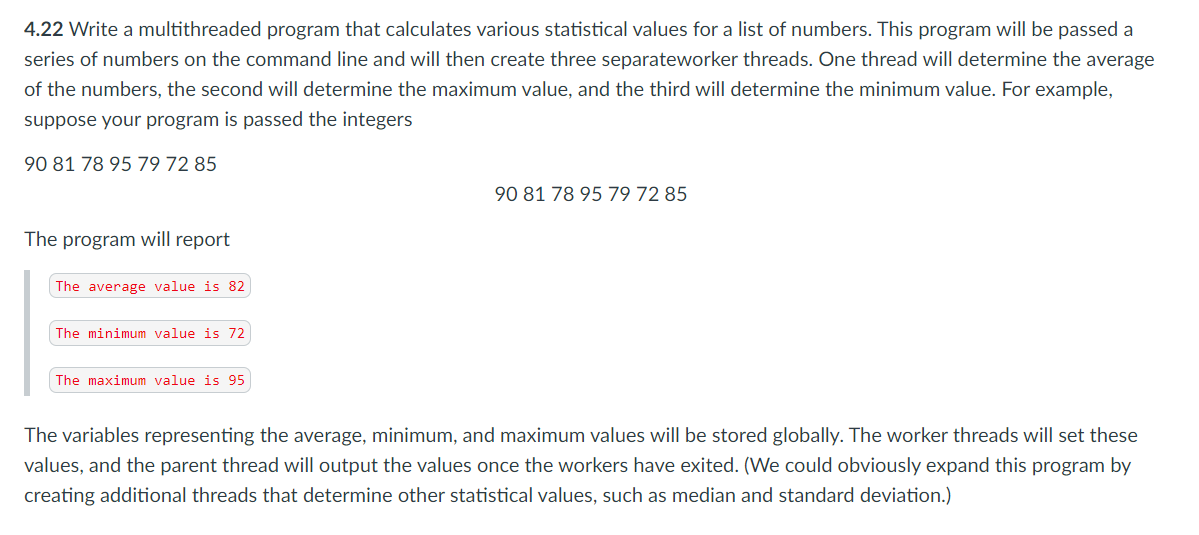4.22 Write a multithreaded program that calculates various statistical values for a list of numbers. This program will be passed a series of numbers on the command line and will then create three separateworker threads. One thread will determine the average of the numbers, the second will determine the maximum value, and the third will determine the minimum value. For example, suppose your program is passed the integers 90 81 78 95 79 72 85 90 81 78 95 79 72 85 The program will report The average value is 82 The minimum value is 72 The maximum value is 95 The variables representing the average, minimum, and maximum values will be stored globally. The worker threads will set these values, and the parent thread will output the values once the workers have exited. (We could obviously expand this program by creating additional threads that determine other statistical values, such as median and standard deviation.)
How do I fix my program?
Here is the assignment.
Here is my program.
#include <stdio.h>
#include <stdlib.h>
#include <pthread.h>
void *avg_func(void *str);
void *min_func(void *ptr);
void *max_func(void *ptr);
double avg;
int min;
int max;
typedef struct datastruct
{
int size;
int * values;
}datastruct;
main(int argc, char *argv[])
{
printf("\n\nWelcome to paheeThredz, by Sean Staz\n\n");
while(argc <=1)
{
printf("Incorrect input. No arguments entered.\n");
printf("Please enter one or more inputs.\n");
exit(0);
}
int i = 0;
int copy[argc-1];
for(i; i < (argc -1); i++)
{
copy[i] = atoi(argv[i+1]);
}
pthread_t thread1, thread2, thread3;
const char *message1 = "This is Thread 1";
const char *message2 = "This is Thread 2";
const char *message3 = "This is Thread 3";
int t1, t2, t3;
printf("Running: %s\n\n", argv[0]);
datastruct ds = {argc - 1, copy};
/* Create independent threads each of which will execute appropriate function*/
t1 = pthread_create(&thread1, NULL, (void *) avg_func, (void *) &ds);
if(t1)
{
fprintf(stderr,"Error - pthread_create() return code: %d\n", t1);
exit(EXIT_FAILURE);
}
t2 = pthread_create(&thread2, NULL, (void *) min_func, (void *) &ds);
if(t2)
{
fprintf(stderr,"Error - pthread_create() return code: %d\n",t2);
exit(EXIT_FAILURE);
}
t3 = pthread_create(&thread3, NULL, (void *) max_func, (void *) &ds);
if(t3)
{
fprintf(stderr,"Error - pthread_create() return code: %d\n", t3);
exit(EXIT_FAILURE);
}
printf("pthread_create() for Thread 1 returns: %d\n",t1);
printf("pthread_create() for Thread 2 returns: %d\n",t2);
printf("pthread_create() for Thread 3 returns: %d\n\n",t3);
/* Wait till threads are complete before main continues. */
pthread_join(thread1, NULL);
pthread_join(thread2, NULL);
pthread_join(thread3, NULL);
printf("The average: %g\n", avg);
printf("The minimum: %d\n", min);
printf("The maximum: %d\n", max);
exit(EXIT_SUCCESS);
}
void *avg_func(void *ptr)
{
datastruct * copy;
copy = (datastruct *) ptr;
int sz = copy->size;
int i;
for(i = 0; i < sz; i++)
{
avg += (copy->values[i]);
} //If I used double for avg it would have given 82.8571 which doesn't match the example output
avg = (int)(avg / sz); //Used cast to match example output given on instructions.
}
void *min_func(void *ptr)
{
datastruct * copy;
copy = (datastruct *) ptr;
int sz = copy->size;
int i;
min = (copy->values[0]);
for(i = 1; i < sz; i++)
{
if(min > (copy->values[i]))
{
min = (copy->values[i]);
}
}
}
void *max_func(void *ptr)
{
datastruct * copy;
copy = (datastruct *) ptr;
int sz = copy->size;
int i;
max = copy->values[0];
for(i = 1; i < sz; i++)
{
if(max < copy->values[i])
{
max = copy->values[i];
}
}
}
Here are the errors:
19 | main(int argc, char *argv[]) | ^ main.cpp: In function ‘int main(int, char**)’: main.cpp:47:41: error: invalid conversion from ‘void*’ to ‘void* (*)(void*)’ [-fpermissive] 47 | t1 = pthread_create(&thread1, NULL, (void *) avg_func, (void *) &ds); | ^~~~~~~~~~~~~~~~~ | | | void* In file included from main.cpp:3: /usr/include/pthread.h:200:15: note: initializing argument 3 of ‘int pthread_create(pthread_t*, const pthread_attr_t*, void* (*)(void*), void*)’ 200 | void *(*__start_routine) (void *), | ~~~~~~~~^~~~~~~~~~~~~~~~~~~~~~~~~ main.cpp:54:41: error: invalid conversion from ‘void*’ to ‘void* (*)(void*)’ [-fpermissive] 54 | t2 = pthread_create(&thread2, NULL, (void *) min_func, (void *) &ds); | ^~~~~~~~~~~~~~~~~ | | | void* In file included from main.cpp:3: /usr/include/pthread.h:200:15: note: initializing argument 3 of ‘int pthread_create(pthread_t*, const pthread_attr_t*, void* (*)(void*), void*)’ 200 | void *(*__start_routine) (void *), | ~~~~~~~~^~~~~~~~~~~~~~~~~~~~~~~~~ main.cpp:61:41: error: invalid conversion from ‘void*’ to ‘void* (*)(void*)’ [-fpermissive] 61 | t3 = pthread_create(&thread3, NULL, (void *) max_func, (void *) &ds); | ^~~~~~~~~~~~~~~~~ | | | void* In file included from main.cpp:3: /usr/include/pthread.h:200:15: note: initializing argument 3 of ‘int pthread_create(pthread_t*, const pthread_attr_t*, void* (*)(void*), void*)’ 200 | void *(*__start_routine) (void *), | ~~~~~~~~^~~~~~~~~~~~~~~~~~~~~~~~~ main.cpp: In function ‘void* avg_func(void*)’: main.cpp:98:1: warning: no return statement in function returning non-void [-Wreturn-type] 98 | } | ^ main.cpp: In function ‘void* min_func(void*)’: main.cpp:116:1: warning: no return statement in function returning non-void [-Wreturn-type] 116 | } | ^ main.cpp: In function ‘void* max_func(void*)’: main.cpp:135:1: warning: no return statement in function returning non-void [-Wreturn-type] 135 | } | ^

Trending now
This is a popular solution!
Step by step
Solved in 2 steps with 1 images









